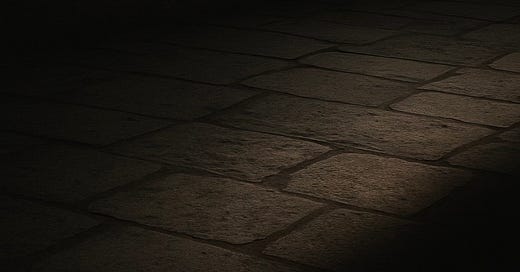What psychology taught me, what it couldn't—and why I find myself drawn to the ancient way.
It's a strange thing, the way life pulls you. One minute, you're certain of your direction—your studies, your professional path, the scaffolding of your dreams and ambitions—and then, quite unexpectedly, you find yourself drawn elsewhere, not by force, of course, but by a quiet kind of tug, a sense that something deeper is waiting.
I've just finished my MSc in Psychology—years of theory, research, and the science of the mind. I'm genuinely grateful for it. Yet, as the empirical dust settles, I find myself restless for something less clinical and more timeless.
Lately, I've been standing at a crossroads (read my piece here), and instead of looking for the next signpost, I've found myself peering backwards—towards something more ancient, towards philosophy, towards the Stoics.
It's odd, really. I hardly know anything about Stoicism. I've only just bought my first set of books on the subject, their spines still uncreased on my desk. But there's a certain ease I feel, a quieting of the mind I haven't known for some time. Perhaps it's the promise of depth—of questions that aren't hurried towards answers, of wisdom that isn't measured in modules or marked by grades.
What's interesting is that, without even realising it, I've often practised certain ancient principles in my own life and for quite some time. I've always valued integrity, resilience, and a kind of inner steadiness—even if I've never attached philosophical names to these qualities.
For a while, I hesitated to explore Stoicism further. It struck me as a rather masculine concept—stiff, reserved, and stoic. However, after some brief reading, those reservations were quickly put to rest. I was wrong about Stoicism being a male-dominated philosophy. In fact, it seems to be a rather inclusive one, open to anyone who seeks to live with strength of character and clarity of mind.
Perhaps that's why I feel drawn to it. I've always believed in living with good character and strong morals, especially in times like these, when our attention is so easily scattered and the world feels so superficial. The "cognitive chaos" we're surrounded by today almost demands a more ancient approach to living. Maybe it's time to learn, as the Stoics did, that we have control over some things and not others—and that wisdom lies in knowing the difference.
There's something about the Stoics that feels almost subversive in our age of noise and distraction. They lived through immense chaos and uncertainty yet wrote about virtue, resilience, and the art of living well.
As Marcus Aurelius wrote,
"You have power over your mind—not outside events. Realise this, and you will find strength."
Hence, they seemed to understand that character is not built in the easy seasons but in the storms. I find myself wondering what it would mean to live with that kind of steadiness—to let my actions be shaped more by principles than by the latest trend or the loudest voice.
It's not that I'm abandoning what I've learned. Psychology has taught me the science of the mind, the mechanics of behaviour, and the patterns that shape us.
Nor am I turning away from a long and meaningful career in fitness, health, and personal development. If anything, I sense that these ancient teachings may help me serve my clients—and myself—with even greater clarity and depth.
But philosophy—at least in its ancient form, seems to offer a different kind of invitation:
It's less about fixing and more about understanding.
It's less about control and more about acceptance.
It's less about the pursuit of happiness and more about the pursuit of meaning.
I'm not sure where this path will lead. I have no grand plan, no ten-step guide to enlightenment me. I'm simply following the questions that feel most alive to me right now:
What does it mean to live with integrity, especially when the world seems to favour the opposite?
How do I hold onto my own values in a time when attention is so easily scattered and superficial?
Can I find peace not in certainty but in the willingness to explore, to wonder, to not know?
There's a certain comfort in admitting I'm a beginner again—that I know so little. That I'm allowed to be curious, to read slowly, to let the words of those long-gone seep into my own way of seeing. Perhaps this is what it means to truly grow—not to accumulate answers, but to deepen the questions.
So, here I am. Not quite sure of the road ahead, but quietly hopeful. If you, too, find yourself drawn to something ancient, something that asks more of your character than your credentials, let's walk this uncertain path together. I'll share what I'm learning, and perhaps you'll share what you're discovering too.
For now, I'll leave you with this:
Sometimes, the most honest thing we can do is to stand at the edge of our own knowing, and simply listen.




